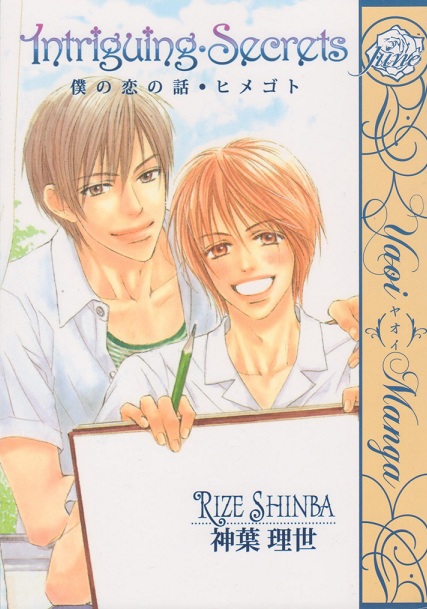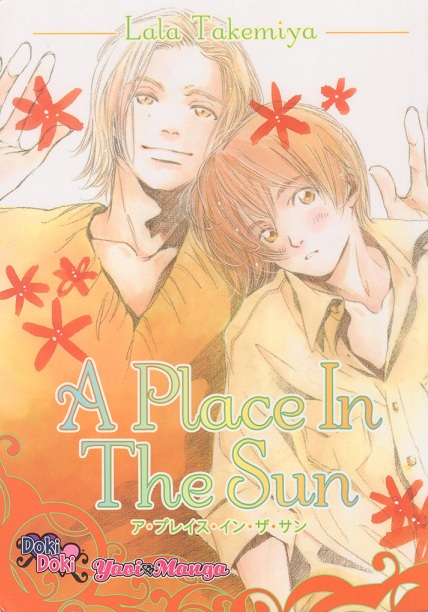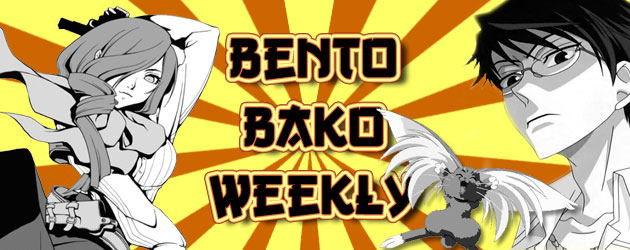It’s a yaoi double feature today, with two titles from Digital Manga Publishing. Both of these books feature sweet stories of a warm and fuzzy nature, and are a pleasant, relaxing read. They both have a young adult rating of 16+.
 Title: Intriguing Secrets
Title: Intriguing Secrets
Author: Rize Shinba (My Bad!)
Publisher: Digital Manga Publishing (Juné)
Volume: One-shot, $12.95
Vintage: 2006 by Houbunsha in Japan, December 2010 by DMP
Umehara is thrown in detention with a classmate he doesn’t get along with, the class clown Mizue. After they finish weeding a part of the campus yard in the hot sun, they end up bonding over a cool drink and Umehara finds Mizue to be a nice guy, instead of the self-absorbed and disagreeable person he thought him to be. Umehara’s artist eye is drawn to Mizue’s simple beauty, and Umehara himself is drawn to the other boy’s cheerful demeanor. To get another chance to hang out with Mizue, Umehara invites him to go shopping for a necktie to apologize to the teacher they angered. He finds himself drawn more and more to Mizue, but grows nervous and confused over his feelings. Unsure of Mizue’s own feelings, Umehara is surprised when he suddenly shows up at the art club’s room and requests that Umehara paint a portrait of him. As they chat, Mizue reveals that he used to play a brass instrument in band, but had to quit because of his weak eardrums. Swayed by Mizue’s sad and lonely sounding story, Umehara reluctantly agrees to do a painting of him, even though he is nervous about painting in front of the other boy, and knows such a painting would only amplify his forbidden feelings. As they begin to spend every day after school together for the painting, Umehara’s feelings grow, so when Mizue teases him about the girls in the art club, Umehara’s nervousness bursts out in anger, and he accidentally tears a button off Mizue’s shirt. Embarrassed, Umehara insists on repairing the shirt himself. Mizue is happy Umehara worked so hard for him, but he again turns the situation into a joke, hiding his feelings from Umehara. One afternoon, Mizue comments on the sounds of the band that drift up from the courtyard below into the art room, causing Umehara to think Mizue only spends time with him to hear the band he is unable to play in due to his ear problems. With such thoughts in his mind, Umehara is taken aback when Mizue kisses him, under the guise of proving how strong lip muscles get blowing through an instrument’s mouthpiece. Again, Mizue turns it into a joke, which infuriates an already embarrassed Umehara. With one misunderstanding after another, and a pair of boys who are too embarrassed to reveal their true feelings, will either of their feelings ever get across?
Ah, this one is so super cute. It’s obvious early on that Mizue likes Umehara, as Shinba reveals moments with him that Umehara doesn’t see (usually simply because Ume’s back is turned). That said, it makes it frustrating for the reader as well as Umehara when Mizue turns each slip of his feelings into a joke. He’s not doing it to be mean; it’s clear that Mizue behaves that way because he doesn’t want to frighten off Umehara. Umehara hides his feelings for the same reason, and puts them all into his painting instead. The story is told through Ume’s point of view, so we don’t get just a ton of insight into Mizue’s thoughts and feelings, but Shinba makes it easy to read Mizue’s facial expressions, which tell us all we need to know. It’s the story of young, budding romance, with just a touch of sexual elements at the very end, that feel a bit gratuitous, tacked on simply to include them as a yaoi trope. Though while that’s an easy impression to get, it still fits into the story, if a bit awkwardly at first. I say this because although it seems to come out of nowhere, it’s short and doesn’t really go anywhere, and things get quickly back to the sweet, romantic nature of the story by the last couple pages.
 Title: A Place in the Sun
Title: A Place in the Sun
Author: Lala Takemiya
Publisher: Digital Manga Publishing (Doki Doki)
Volume: One-shot, $12.95
Vintage: 2003 by Shinshokan, December 2010 by DMP
A Place in the Sun is a charming collection of simple short stories. “Topping Boys” is the story of love unfolding between two college boys who have been friends since childhood, and now attend a cooking school together. When they were little, Hirosuke’s parents divorced and forced their son to choose between them. At the time, he and Yusuke were close friends, so rather than choose between his parents, he chose to stay with Yusuke. Hirosuke ended up living with his mother, who was usually too busy running her restaurant to care for him, so he and Yusuke took care of themselves and learned to have fun cooking together and experimenting in the kitchen. Now that they’re older, Hirosuke had adopted the habit of going through girls like toppings on a plate of pasta, and Yusuke cleans up after him. But Yusuke, who has harbored feelings for Hirosuke for many years, goes over the edge when Hirosuke decides that woman are too much trouble and starts getting a little too close to one of their male teachers. Yusuke, desiring to be the one constant in his friend’s life, feels his positioned dangered, and lets his feelings come pouring out. Their relationship is very cute, though Hirosuke is a little oblivious to things. Hiro is the kind of guy who fools around with lots of girls, but somehow manages to never break any hearts by not getting deeply involved and using Yusuke, with his good looks and kind nature, to do the breaking up for him. It seems that Yusuke was content with the arrangement because Hiro never got deeply involved with anyone, but when that seemed to be in danger, it pushed him to make a move. The next story, “Dustbin Space,” is my favorite of the bunch. It also runs longer than the others, with three chapters. Gaku is a clumsy and forgetful young man, who frequently forgets to get his trash out on time. One morning, after falling drunkenly asleep in a pile of trash bags, Gaku is awakened by the local dump truck and rushes to collect his trash. When he delivers it to a handsome and skilled young garbage collector, the garbageman yells at him for not sorting his trash properly. He happens to run into the young garbage man again while in town, and the two eat lunch together; Gaku realizes that the garbageman, named Kuwanara, is actually quite nice and dedicated to his job. As they talk, Gaku learns how dangerous the job of garbageman can be, as improperly sorted trash can cause serious injury to collectors. Gaku vows to prove that he is capable of following the proper rules, but accidentally ends up injuring Kuwanara when he hastily gathers his trash one morning. Distraught, and unable to apologize as Kuwanara has not been showing up for work, Gaku finds out where Kuwanara lives and pays him a visit. The story is a little on the silly side at times, and focuses a lot of the proper way to dispose of garbage, so much so that it can overwhelm the romance at times. Fortunately, Gaku’s earnestness is quite adorable, and it’s actually rather sweet how his feelings for Kuwanara make him more aware of the waste he creates and cause him to make subtle changes in his habits.
Moving on, we come to “Afraid to Love.” It’s a very short and somewhat ambiguous story about two high school seniors who have been friends for many years. Kotaro has a had time with relationships, and has gone through many girls over the years. His inability to commit stems from his love for his best friend Yukio. Yukio, a strict boy who frequently admonishes Kotaro for his behavior, likes relationships with a lot of communication, with frequent emails and text messages. A lot of repetitive maintenance that Kotaro views as meaningless and boring. Unfortunately, he can’t get Yukio out of his mind, and his worries literally drive him feverish, causing him to collapse in class. He wakes to the annoyed voice of his true love. This one isn’t romantic in the sense that the characters don’t develop a romantic relationship. It’s entirely one-sided and told from Kotaro’s point of view, with not much evidence of Yukio’s feelings. Also, I lied. The next story, “My Manga Sensei,” if my favorite story. Or maybe it’s tied with “Dustbin Space.” Nori is in love. He writes letters to his favorite mangaka about his feelings for fellow classmate Hatakeyama. The eccentric Hatakeyama shows interest in one of Nori’s favorite manga, which makes Nori happy. He expresses his frustration with not knowing what happens next in the story, and notes that he is so obsessed that he loses sleep at night thinking about it. In response, Hatakeyama surprises him with a kiss. He claims that he is only showing Nori what happens next in the story, and begins revealing various details of the story to Nori. Why does Hatakeyama know the details of his favorite mangaka’s manga? It’s a very warm story. The once lonely and solitary Hatakeyama finds himself drawn to the kind Nori, who invited him to eat lunch on his first day after transferring from another school. On top of that, he spots Nori reading a certain manga, and feels even more drawn to him. I love seeing outcasts find happiness. The final story is “A Place in the Sun.” Shu and Midori met at a work-training program for a plant rental warehouse. They became good friends, finding solidarity with each other while surrounded by an office filled with girls. Midori, who had been surrounded by females who spoiled him all his life, feels indifferent about females as sexual beings. Since they make such a good work team, they are sent to a troublesome store that has been holding out, with an owner wary of big corporations. The store is located on the coast, and when Midori fails to come home one evening after meeting with the owner, Shu drives all the way out there to get him. It’s subtle, but Shu notices Midori’s reluctance to leave the beautiful and peaceful shore. This is another story without a clear relationship formed, but there’s a slow, calm love beneath the surface that could bloom if it was given the freedom it needs to develop. It’s very short, so it’s a little hard to absorb the busyness of office life and compare it to the quiet life of a small shop by the sea, which is what the story is trying to convey. All in all, this is a decent collection of stories, and would be a good choice for those new to the genre.
Editor’s Note: ComicAttack.net has been officially nominated for an Eagle Award! Please click here to vote for us in the “Favorite Comic Book Website” category (question #27). Thank you for your continued support!
Kris
kristin@comicattack.net
@girlg33k_kris
Review copies provided by Digital Manga Publishing.

